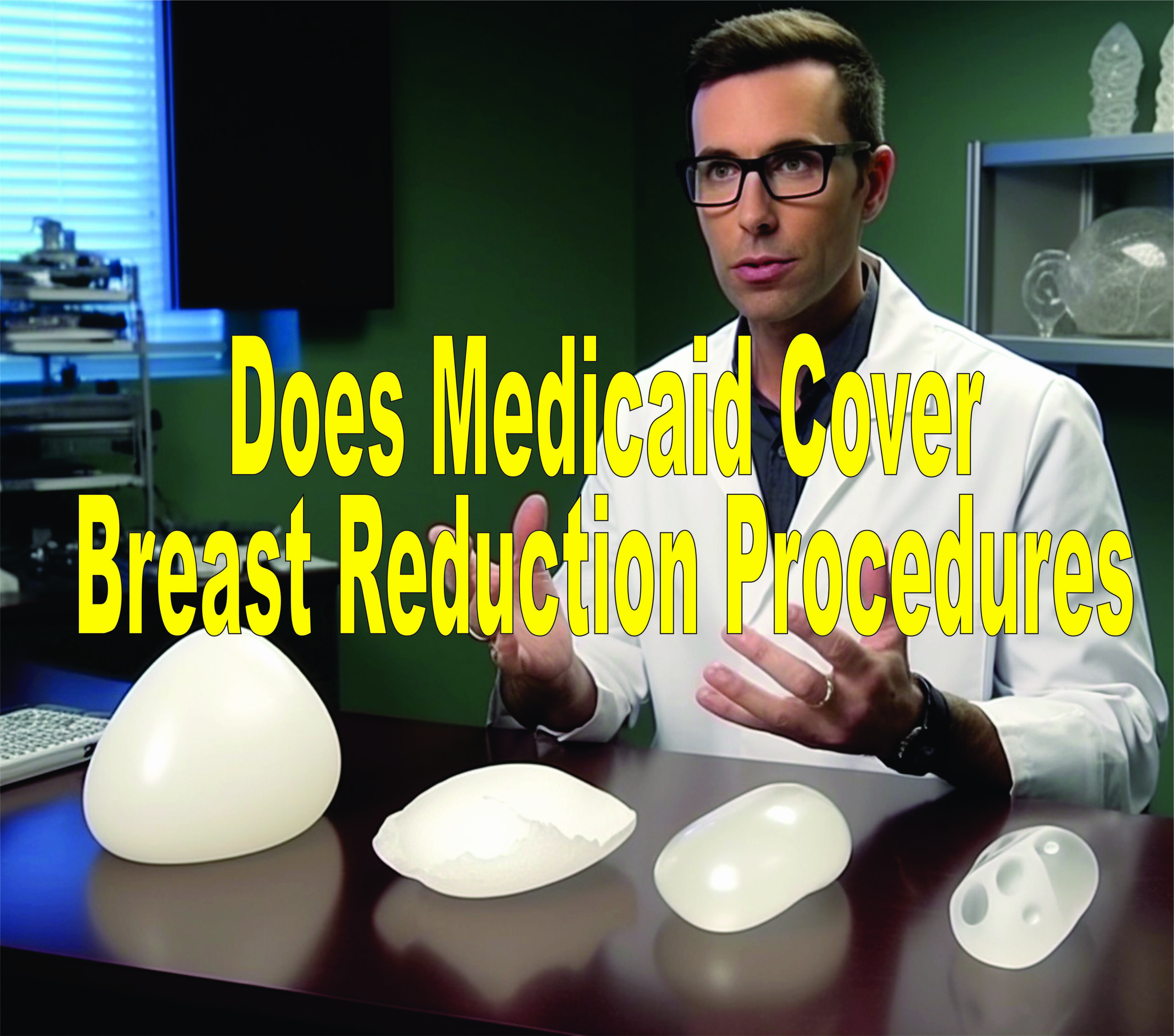Does Medicaid Cover Breast Reduction Procedures?

Last Updated on October 17, 2023 by Lori Pace
Do you have intense back and neck pain due to large, heavy breasts? Figuring out the right medical attention can be tricky, especially if you’re unsure if Medicaid will cover breast reduction surgery expenses. Let’s see if and how Medicaid covers this operation. You’ll get a clearer comprehension of your possibilities and the financial aid that you may be entitled to.
Does Medicaid cover breast reduction procedures?
The answer is yes – depending on the state’s Medicaid program. To find out if you are eligible, you should talk to your primary care provider or a specialist.
However, be aware that there may be out-of-pocket costs for the surgery, coinsurance, and extra charges for anesthesia or assessments. To get full clarity on the financials, contact your local Medicaid office or healthcare provider.
How to obtain Medicaid coverage for breast reduction?
Ready to access Medicaid coverage for breast reduction? Follow this 4-step guide!
Step 1: Speak to your primary care doctor to discuss your medical condition and if surgery is necessary.
Step 2: Make sure you’re signed up for a Medicaid-approved facility.
Step 3: Submit all the paperwork and applications to Medicaid for approval.
Step 4: Schedule the surgery at an outpatient facility that accepts Medicaid.
Remember: Medicaid coverage might vary depending on your case and state. To learn more about eligibility and coverage, contact your local Medicaid office or visit their website!
Plus, here’s a bonus fact: Breast reduction surgery can help reduce physical discomforts such as neck pain and fatigue. (Source: American Society of Plastic Surgeons)
So, why not use Medicaid coverage for the perfect chance to say goodbye to back pain and say hello to a better balance?
Specific breast reduction procedures covered under Medicaid

Medicaid covers some breast reduction surgeries. These include:
- Removal of significant tissue to reduce physical symptoms like back and neck pain.
- Reconstruction after mastectomy or injury.
- Contralateral breast reduction for symmetry.
- Routine breast exams.
- Anesthesia during breast reduction surgery.
- Breast biopsies and post-operative care.
You must check with your provider or primary care doctor about specific coverage limits. Also, verify the extent of coverage and any out-of-pocket expenses.
Preventive Mastectomy
Preventive mastectomy is a surgical procedure that reduces the risk of breast cancer in individuals with a high genetic risk. It involves removing the breast tissue. This surgery is recommended for those with a family history of breast cancer or positive BRCA gene tests.
Male Gynecomastia Mastectomy
Got Male Gynecomastia? Don’t worry, Medicaid covers breast reduction surgery for men too!
This mastectomy procedure aims to remove the excess breast tissues due to unusually swollen mammary glands in male patients. The surgery allows the male chest area to look flatter and more normal. Thus, improving self-esteem and confidence.
Mammoplasty (Reduction)
Mammoplasty is a surgical procedure for reducing female breast tissue. It may be done to relieve pain or discomfort caused by large breasts or for cosmetic reasons. Medicaid covers mammoplasty (reduction) if certain medical conditions are met.
Check out this table to learn more:

| Medical Condition | Coverage for Breast Reduction |
| Debilitating condition causing neck, back, or shoulder pain | Covered |
| Failure of physical therapy or pain relievers to alleviate symptoms | Covered |
| History of breast cancer requiring breast reconstructive surgery | Covered |
| Moderate to severe asymmetry resulting in contralateral breast reduction | Covered |
It’s important to confirm coverage details with Medicaid to make sure you meet eligibility requirements. Also, know the costs involved and consult with healthcare and financial professionals to make an informed decision.
Breast Reconstruction
Breast reconstruction procedures are indicated for patients with serious breast deformities caused by illness, trauma, or other surgical procedures. Surgeons strive to create a breast mound that looks like a natural breast.
Breast reconstruction offers more than just cosmetic benefits. It can make a significant impact on psychological and emotional well-being. It can give women who have had a mastectomy back their confidence.
What to expect BEFORE the procedure?
Before breast reduction surgery, be aware of a few things:
- Understand the cost. Medicaid might cover it, but you may still have out-of-pocket costs. It’s important to know these in advance.
- Also, consider the physical and emotional changes from the surgery. Breast reduction means removing some tissue, which could mean a smaller size and shape. This can affect your body image and self-esteem.
- Be prepared for recovery too. You may have pain, fatigue, and limited mobility. Follow your doctor’s instructions for managing pain and any physical therapy.
- Before the surgery, go to a qualified medical professional for an evaluation. They’ll assess your medical condition and ensure you meet the procedure criteria.
- Know the limitations of Medicaid coverage for breast reduction. Coverage varies with each plan and state. Contact your provider or a healthcare professional to find out if you’re eligible.
Overall, understand all aspects of the procedure, including costs, risks and benefits, and any insurance or state restrictions.
What to expect DURING the procedure?
During breast reduction surgery, patients can expect certain things. These include:
- Anesthesia for pain management
- Incisions to remove a specific amount of tissue
- Reshaping and lifting the breasts
For those seeking coverage through Medicaid, it is important to check with their provider. It’s also wise to consult with primary care doctors or healthcare professionals specializing in neck pain and other symptoms. This can help in obtaining insurance coverage. Documentation such as medical records and evidence of debilitating conditions related to breast size should be gathered.
By doing this, individuals can increase their chances of getting approved for the procedure and minimize out-of-pocket costs. Medicaid policies should be reviewed to understand the specific requirements.
What to expect AFTER the procedure?
Patients should anticipate physical and emotional changes following surgery. This includes discomfort, pain, swelling, and bruising. Pain relievers and compression garments can help reduce inflammation and maintain the newly formed breast mound.
Fatigue is normal due to the body’s energy expenditure. Patients should rest and gradually increase physical activity.
Lastly, body image perception may be altered, leading to emotional impacts. Support from loved ones or counseling can be beneficial.
Frequently Asked Questions
What criteria does Medicaid consider when determining if breast reduction is medically necessary?
Medicaid considers various factors when determining if breast reduction is medically necessary, including the amount of tissue to be removed, the impact on overall health, and any related physical symptoms, such as pain or discomfort.
Are there any limitations or restrictions on Medicaid coverage for breast reduction?
Yes, Medicaid may have limitations or restrictions on coverage for breast reduction surgery. These can include age restrictions, specific medical conditions that warrant the procedure, or the use of conservative treatment options prior to surgery.
Will Medicaid cover breast reduction for cosmetic reasons?
No, Medicaid typically does not cover breast reduction surgery for purely cosmetic reasons. The procedure must be deemed medically necessary to alleviate physical symptoms or improve overall health.
How can I find a healthcare provider who accepts Medicaid for breast reduction?
You can contact your local Medicaid office or visit their website to find a list of healthcare providers who accept Medicaid for breast reduction. Additionally, you can ask your primary care physician for referrals to specialists who accept Medicaid.
Conclusion
Medicaid coverage for breast reduction is a complex topic with varying factors to consider. However, it is important to note that Medicaid may cover breast reduction in certain cases, such as when it is deemed medically necessary to alleviate physical discomfort or health issues.
Factors such as the patient’s health condition, documentation from healthcare professionals, and prior authorization from Medicaid may be required to determine eligibility. For individuals considering breast reduction surgery, it is advisable to consult with healthcare providers and the respective Medicaid program to understand the specific coverage criteria and process.
Ensuring proper understanding and fulfilling necessary requirements can increase the chances of obtaining Medicaid coverage for breast reduction.






